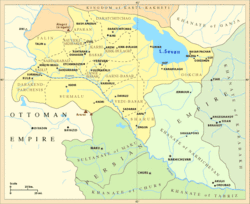| Revision as of 14:36, 3 March 2007 view sourceEupator (talk | contribs)Extended confirmed users, Pending changes reviewers9,166 edits GM if you can prove the attribution do so, don't remove it← Previous edit | Revision as of 07:52, 6 March 2007 view source Parishan (talk | contribs)Autopatrolled, Extended confirmed users13,427 edits →See alsoNext edit → | ||
| Line 13: | Line 13: | ||
| *] | *] | ||
| *] | *] | ||
| *] | |||
| ] | ] | ||
Revision as of 07:52, 6 March 2007

The Erivan (Yerevan), Erwan (آرون) or Irevan khanate was a Muslim principality mostly under the dominion of the Persian Empire between 1747 and 1828, roughly corresponding to most of present-day central Armenia, the Iğdır Province of Turkey, and the Sharur and Sadarak rayons of Azerbaijan's Nakhichevan exclave. As a result of the Persian defeat in the last Russo-Persian War, it was ceded to the Russian Empire in accordance with the Treaty of Turkmanchai.
During the existence of the Erivan khanate, its population consisted primarily of Persians (settled largely around the capital), Azerbaijanis (both settled and seminomadic), and Kurds (largely nomadic). Shia Islam was the predominate faith of the khanate (with some Kurds of the Sunni school). Yazidis were also known to be numerous. Armenians formed less than 20% of the population as a result of Shah Abbas I's deportation of much of the Armenian population from the Ararat valley and the surrounding region in 1605.
"The Khanate of Erivan, on both sides of the Araxes, and the Khanate of Nakhichevan, a part of the ancient Armenia, fell into the hands of the conquerors."
References
- ^ Hewsen, Robert H. (2001). Armenia: A Historical Atlas. The University of Chicago Press. pp. p. 168. ISBN 0-226-33228-4.
{{cite book}}:|pages=has extra text (help) - von Haxthausen, Baron (2000). Transcaucasia: Sketches of the Nations and Races between the Black Sea and the Caspian. Adamant Media Corporation. pp. p. 252. ISBN 1402183674.
{{cite book}}:|pages=has extra text (help) - History of the War in Afghanistan - Page 145 by John William Kaye
See also
This Armenian history-related article is a stub. You can help Misplaced Pages by expanding it. |
This Iran-related article is a stub. You can help Misplaced Pages by expanding it. |